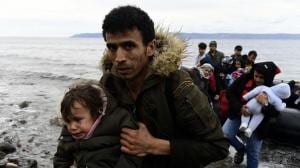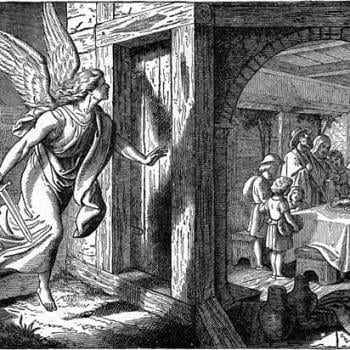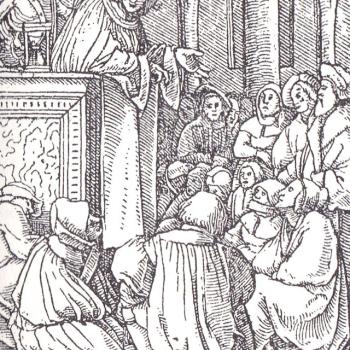ANTICIPATING PASSOVER
Four Steps to Freedom
James Ishmael Ford
In the Christian calendar today is Palm Sunday. It inaugurates what is called Holy Week, which will retell the story of Jesus going into Jerusalem, celebrate a Passover meal with his friends, be arrested, tried, tortured, and crucified. Then, next Sunday, in the great myth of the Christian story, he will rise from the dead.
It is a powerful story, with many nuances and invitations for anyone wishing to dig deep into the contours of our human hearts. It is an ancient story with roots that go back to the dreams of our most distant ancestors. So even people who do not take it as literal, but who are willing to find the echoes of their, our own lives within that story, can find ample reason to experience the rhythms which will be unfolding.
But I find myself thinking more about another holy day which will start its own rhythmic celebrations in the middle of this year’s Holy Week. This year Passover celebrations begin on Wednesday. And, me, I find myself anticipating Passover.
It is that holy season which has captured my heart this year. And I find myself wondering what it might mean for us, all of us, whether Jewish or Christian or, well, I believe actually it has something to say to all of us. On the one hand it is a pivot point for Holy Week. Jesus, after all, goes with his friends into Jerusalem to celebrate Passover and famously joins those friends for a sacred meal. It is the Passover feast.
Perhaps you’re not familiar with it. So, to start let me tell you a story.
Once upon a time well before anyone had heard the phrase “social distancing,” following services at the First Unitarian Universalist Congregation of a small college town, the parents were in the front and the kids in the back seats of their pale green Prius. All, need I add, appropriately belted. The family was on its way to see relatives in the Big City for dinner.
Once they were well on their way, Sally turned and asked their eldest what she learned in Religious Education that day? Jessica replied, “We learned about Passover. It was amazing. Moses was this big guy, played football in college. Well, he tackled the Pharaoh and knocked him down. While the Pharaoh was getting up, Moses quickly gathered the Israelites together and they all ran toward the river. As soon as they got there Moses had his Corps of Engineers throw up a pontoon bridge. Then when they got across and while the Egyptians were on the bridge, Moses called in air support and they blew the whole thing up.”
There was a bit of silence in the car as they continued on their way. Finally, Sally asked in a hoarse whisper, “That’s what your Sunday school teachers taught?”
“Not really,” replied the girl. “But if I told you the story the way they did, you’d never believe it.”
I understand that. Perhaps the story doesn’t quite hang together for you as history, either. And, you know, it doesn’t really work for those who professionally study ancient Near Eastern religions, either. At least not among those with no dog in the hunt. Now this is not likely to be news to you. The mainstream of the scholarly community is confident that there was in fact no Egyptian captivity, no Moses, no forty years wandering, and no military assault on the shores of the Dead Sea. It was all made up.
A rather more likely story, one consistent with what we know of the historical record and archeology is this. There were among other peoples living in a place called Canaan, basically that area we now call Israel and Palestine, a rag tag band of refugees from various conflicts and abuses. Over time they cobbled together a community up in the hill country. If you use the term loosely, eventually they became a small kingdom. It wasn’t a lot different than any of the others in that area. They had their own god, and their spiritual leaders said it was the best god. But most of them were careful not to annoy the other gods of the area, and tokens of those deities were on almost every home altar.
The kingdom had its ups and downs. At some point it divided into two. The Northern kingdom was swept away in one of the numerous invasions that swirled around the area. But the southern kingdom continued. Until, that is, the Babylonian armies marched through in the year 605 before our common era.
As often happened in those days, the conquerors took the cream of the local crop, the artisans, the poets, the intellectuals, and carried them captive to Babylon. Normally this would be the end of the story. Up until this time conquered peoples would gradually be assimilated, and except for a style of pottery or a story or two most all memory of that conquered people would slip away and be no more than another echo among the many stories that we humans tell about ourselves.
This time something different happened. It was there, in the Babylonian captivity that these exiles began to weave together the stories we now know as the Exodus. They took fragments of this and that, added in allusions to their own situation and, well, we know what they came up with. In that story they reimagined a dreamscape of amazing power. Perhaps most important was how their idea of who and what their god was shifted. This deity was no longer the best god, it was the only God. And, while it was the God of all peoples, it had a particular special relationship with these exiles stranded by the waters of Babylon.
And, all of it came together in the story of another captivity, in mystical Egypt. It told of a prophet rising from among the people who spoke directly with the true God. And, it told how with his leadership he led them out of captivity and to freedom.
Truth be told, I love the Exodus story even more for it not being so much a history lesson as an articulation of the aspiration, the dream of a crushed and dominated people seeking an identity. And then in that creating out of their own human imaginations and hearts something quite wonderful. This dream nation, this dream of healing and home is something I can identify with.
As in fact have many, so many over the years. It has sustained slaves in many cultures. It has sustained the oppressed everywhere. It has been the dream of broken hearts for two and a half millennia and continues to be so.
And today, in this hard, hard time, a time getting harder yet. In this time before we can hope for a break, perhaps this story has some wisdom for us. I feel it. I believe it. And, so, let me explain how I find it might be helpful.
Solace in hard times is a major project of religion, of spirituality. We ask about meaning and direction. We wonder about what is holy and how to make lives worth living in these hard times. And, here’s a small secret. It’s always hard times. Yes, we are facing a unique period of suffering. And according to those who understand the currents of Covid-19, it’s going to get worse before it’s over. And, of course, there are many other oppressions going on at the same time, both within our hearts and impacting many bodies. We are all of us in captivity.
Of one sort or another, all of us are captive and dreaming off freedom. We are, in addition, most all of us, also Pharaoh. I’ll say that, but I’ll save that investigation for another day.
Here’s the important story, the critical one. This is the part that resonates across cultures and time. We are called from Egypt. Which in Hebrew is Mitzrayim, the narrow or constricted place. We are called to freedom, to the great boundless. And not in some fabled past. But here and today. Cut to the chase, and Passover is about the spiritual quest. Yours. Mine. Ours.
It has a social component, a call to justice for peoples. And that is informed by a shifting of human hearts. Today I want to reflect on the intimate part. It can inform how we act in this world in ways we may not immediately notice. But which are critical.
I was raised Baptist. So, the celebration of Passover, the Seder feast was introduced to me as an adult. As a stranger in a strange land, I was gifted with outsider eyes. And with them being able to see some aspects of that celebration which might be useful to all of us, whether we’re Jewish or not. It really is in fact a universal story.
And as something universal, it is intriguing to notice how the Seder ritual at the heart of the Passover observance as we encounter it today appears to be modeled on the ancient Greek Symposium. The Symposium is a structured conversation. Sometimes it can be little more than a drinking party. But at its best, and usually it is, it is an opportunity for a deep conversation about things that matter most. Think of Plato’s dialogue of the same name.
And that structure is very important. Within this framed conversation, the Seder celebration of Passover, there are four steps. By following these steps, we are invited into our own investigation of bondage and freedom. So, in our limited time here, let’s take just a brief glance at how they arise and how we might take that walk ourselves.
First, there’s a dedication. This is where we set our intention. It occurs when we notice what’s going on. How we have been in bondage? To what specifically? Well, each of us follows our own path. Alcohol? Sex? Work? An all-consuming view of the world that with any distance at all, doesn’t in fact seem to be true? What has enthralled us and kept us from whole lives? Our intention is to move beyond our narrowness, our obsessions, our addictions, what I think of as our ego-driven desire-oriented lives. And toward holiness, toward the whole, toward expansion and generosity, curiosity, and engagement.
The second thing in the Seder is a ritual washing. Here our intention is given its first concrete expression. We wash, we clean up, we tidy up the messes we’ve made out of that sense of narrowness, of separation, of constriction. It’s easy to see how this should be so. When you want to cook, the first thing to do is to clean up. In AA, one of our more interesting contemporary spiritual communities, one of the first steps is to atone for the wrong’s one has committed.
Third, we take nourishment, but of the humblest sort. Just something to drink, some vegetables and a little quick bread. Here our profoundest needs are represented in hunger. We all must eat. And we should never forget our bodies, ourselves, our relationships with others. In this Passover ritual the satisfaction of our heart’s longing is found easily, and in the simplest thing, within hunger and nourishment.
Fourth, and last, is a breaking with the things that bind us. Often, maybe of course, this is the hardest thing to accept when we embark on a spiritual journey. We tend to want it easy. We tend not to want to hurt. And breaking is hard. In the Seder ritual this breaking is of the matzoth, the bread. In reality, however, it’s about our own breaking. It’s the need for us to surrender being right or, for some of us, of being wrong. We need to not believe everything we think. Maybe we shouldn’t believe anything we think. We need to open ourselves to curiosity, to engagement, to not turning away. We need to let go. We need to allow the world in all its terribly glory to present and then to do what it must with us.
Within this last part there is the sharing of stories. I really believe we are the symbol-bearing animal. Our minds, our worlds, our hopes all are woven out of stories. There are many good and true stories. That of Jesus, that of the Buddha, to name just two. And here we have the story of Exodus, a truest of true stories. Here we’re given the big picture, the long view, the wide perspective of genuine wisdom.
At Passover, out of this telling of stories, come the questions. In the Seder all our questions are reduced to four. If you’re interested and don’t know what the specific questions are, I suggest later you google “four” “questions” and “Seder.” You’ll learn some interesting things. But broadly the questions mark out the Passover event.
And it turns out they’re less questions than a single woven together statement within its four parts. Our lives are a rush to get away from something and toward something. Slavery of any sort is as bitter as bitter can be. But we’re moving from that bitter to the sweet. And thanks to our taking this journey, this sacred journey, today, today we can live in freedom.
Wherever we are, whatever our condition, we can find freedom.
People have been telling this story for generations piled upon generations. And there’s another wrinkle that happens because of that. I have a number of friends who observe the Seder every year. Part of what happens when this celebration is observed year after year, because of a death in the family, who plays what parts change. And with that some have to move into places within that celebration that they thought were reserved for their elders. But they have now become the elders. This stepping up and taking our place in our time, as it has been for the many generations, is something daunting, and powerful.
With that, for us, today, here, a simple message: We are all of us caught up, bound by things, circumstances, often of our own creation. But we don’t have to continue that way. If we notice, we can set a goal of moving away from those constrictions of our lives. And then, we can do it. Taking a chance, breaking old patterns, living into new lives.
And there’s something of a cycle here. There are always aspects of our lives that bind us, and so we get to do it again. Not exactly a circle. More, a spiral.
And so each time our place is a little different.
Each time we can be a little closer to that dream Jerusalem of which those ancient exiles found their hearts calling.
To that gate through which we can walk. To paradise.
Next year. Maybe.
And this year. Absolutely.
With each breath.
Hope arises.
If, that is, we open our hearts, and are ready to step forward.
The Passover mystery.
Amen.












